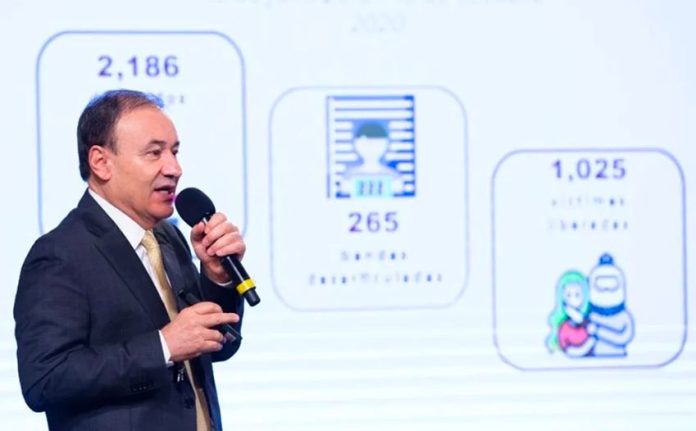Homicides increased in 10 states and decreased in 22 in the first nine months of 2020 compared to the same period last year, Security Minister Alfonso Durazo said Wednesday.
He told President López Obrador’s press conference that homicides increased between January and September in Hidalgo, Durango, Chihuahua, Campeche, Michoacán, Sonora, Guanajuato, Yucatán, San Luis Potosí and Zacatecas.
Guanajuato has been the most violent state in the country this year, with more than 3,000 homicides in the first nine months.
Durazo, who is leaving his position to seek to be the Morena party candidate for governor next year in his native Sonora, said there were 2,807 homicides and femicides in September. That’s 243 fewer than in August, an 8% decline.
The combined figures for those crimes have now decreased in two consecutive months, he said, asserting that Mexico has reached an “inflection point.”
However, homicide numbers for the first nine months of the year – 26,231 – are 1% higher than in the same period of 2019, which was Mexico’s most violent year on record.
Femicides also rose slightly between January and September, increasing 0.4% from 721 in the first nine months of 2019 to 724 in the same period this year.
Durazo presented data for numerous other crimes, all of which decreased this year compared to the first nine months of 2019 with the exception of federal organized crime offenses, which include terrorism, arms trafficking, human trafficking, trafficking of human organs and sexual crimes against children.
Among the crimes whose incidence decreased significantly were petroleum theft, which fell 48.6%, and kidnappings, which declined 37.6%.
Extortion, vehicle theft, rape, business robberies, cattle theft, drug trafficking, assaults, financial crimes, firearms offenses, electoral crimes and crimes committed by public officials also declined in the first nine months, according to data presented by Durazo.
But while the decreases in those crimes are welcome, the federal government will ultimately be judged on its ability or otherwise to reduce the high numbers of murders.
In the 22 months between December 2018 – the month López Obrador took office – and September 2020, there were a total of 65,549 victims of homicide and femicide, according to National Public Security System data.
The figure is 10.9% higher than the 59,112 victims of the same crimes in the final 22 months of the government led by former president Enrique Peña Nieto.
López Obrador assumed the presidency pledging to reduce violence through a so-called “hugs, not bullets” security strategy that favors addressing the root causes of crime through social programs and the creation of job opportunities rather than combatting it with force.
He promised to gradually withdraw the military from the nation’s streets but published a decree in May ordering the armed forces to continue carrying out public security tasks for another four years.
That decision appeared to acknowledge that the National Guard, a new quasi-military security force created by the current federal government, had failed in its mission to reduce violence.
Source: Reforma (sp), El Universal (sp)
